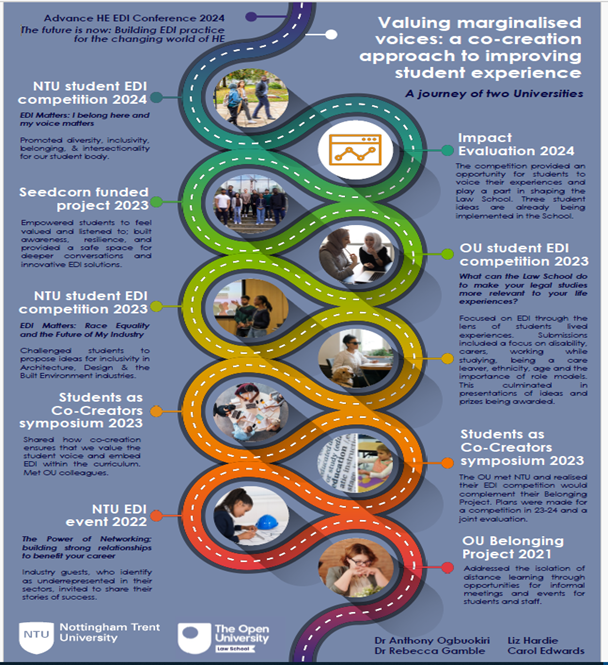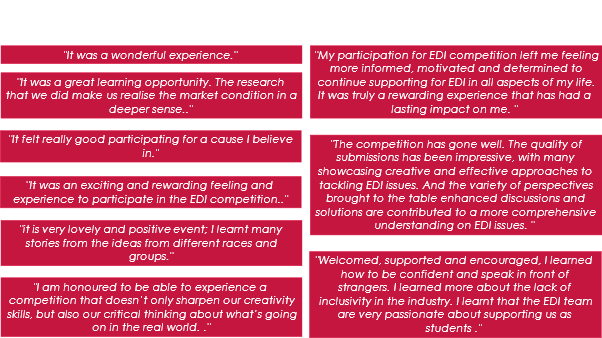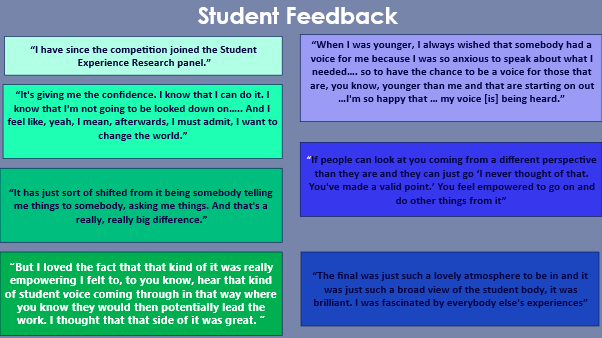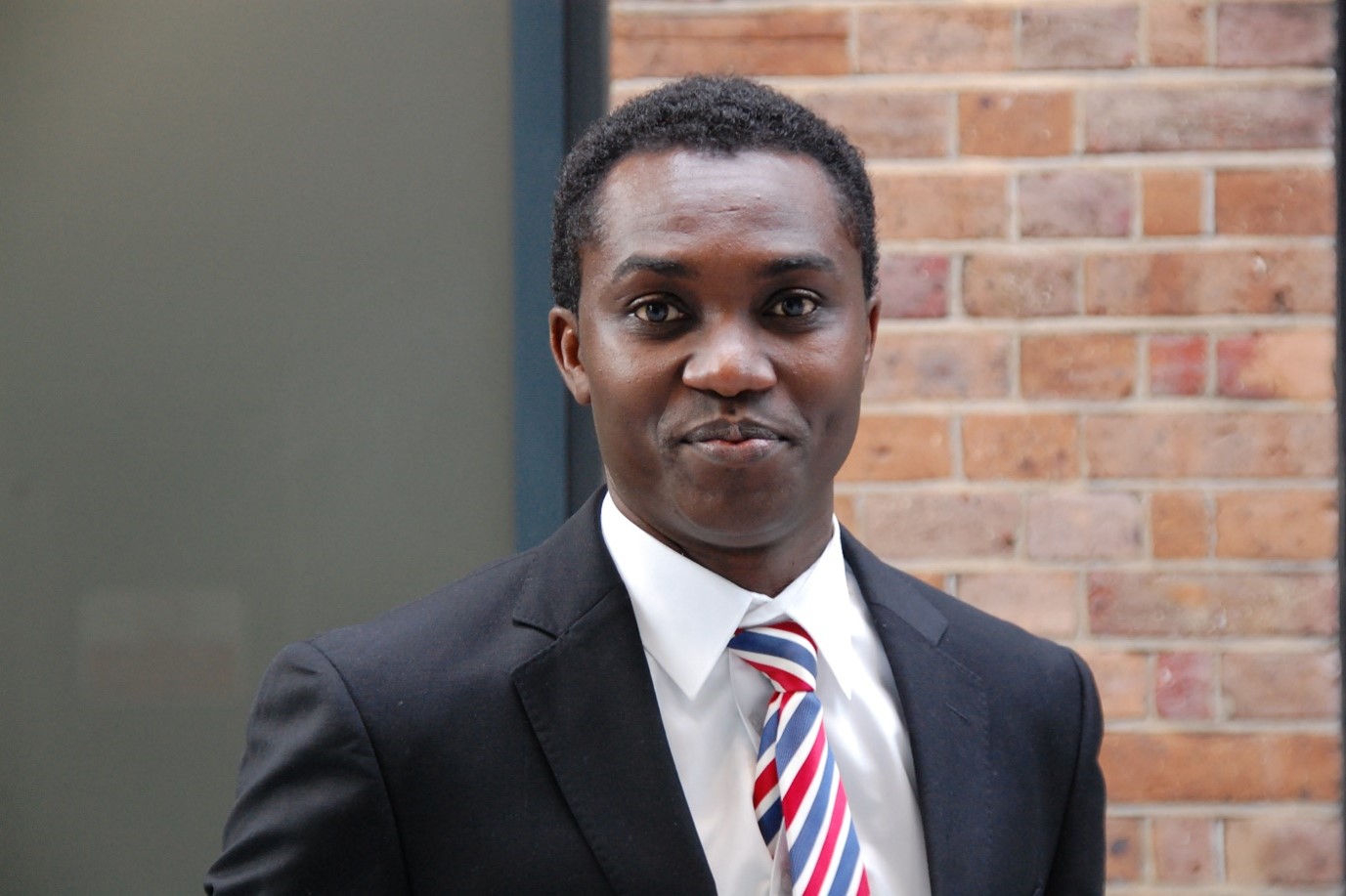You are here
- Home
- Blog
- A journey into the unknown: Valuing marginalised voices: a co-creation approach to improving student experience
A journey into the unknown: Valuing marginalised voices: a co-creation approach to improving student experience

By Liz Hardie (OU) and Anthony Ogbuokiri (NTU)
Long gone are the days when students attended University, completed their course and moved on. In today’s HE environment students want to know that their views are taken seriously. They want the opportunity to influence both the teaching and governance of their educational provider[1].
Over the last eighteen months the Open University (OU) Law School and Nottingham Trent University (NTU)’s School of Architecture, Design, and the Built Environment have been working together to find different ways of involving students in consultation and co-creation activities. Our shared aim was to ensure that all of our students, particularly those from diverse backgrounds, had the opportunity to tell us their views and influence the teaching within our Schools. Preparing for a conference presentation on our joint work provided the opportunity to reflect together. The poster prepared for the conference is below.

Figure 1: Poster prepared for the conference
Co-creation
Our projects are all based on the idea of co-creation, which is an increasingly popular way of working with students and recommended by many bodies and reviews[2]. Co-creation involves students as active participants in the learning process, constructing understanding and resources alongside academic staff[3]. Advance HE (formerly the Higher Education Academy) describes it as “engagement through partnership where staff and students work together to create meaningful resources”[4]. The literature shows that there are many benefits for students and staff in using co-creation. For students this includes better outcomes for academic learning and better student engagement, while for staff benefits include enhanced or better outputs and a better insight into the student lived experience[5].
However, we were also aware that establishing an inclusive approach to co-creation can be challenging, particularly where working with students on a smaller-scale projects outside the assessed curriculum. Students who volunteer for these projects can be those who are already confident and succeeding in their learning, or who are articulate enough to contribute in expected ways within academia[6]. Research indicates that many of these schemes are not inclusive of diverse students and risk leaving out already marginalised students and staff[7]. Our journey together has therefore had as its focus the development of alternative ways of co-creating to ensure the inclusion of marginalised voices or those who traditionally do not get involved in such schemes.
NTU and OU projects
NTU runs three main project strands: Promoting belongingness and inclusivity through networking programmes, advancing co-creation of EDI solutions through incentivised EDI competitions, and Closing the Gap projects addressing any attainment gaps affecting under-represented groups. One of the competitions is ‘EDI Matters’ designed to challenge students to co-create solutions to EDI problems in the sector both within the academia and industry and has been running since 2021. Previous competitions have focussed on key areas such as race, gender, and other protected characteristics as well as intersectionality. Now established as an annual School event, the competition has attracted sponsorship from the industry partners such as Turner and Townsend, Waldeck Construction, Bowmer and Kirkland, and Scape.
The Open University Law School’s Belonging project started in 2020, in response to student feedback about the need for enhanced peer support. However following our conversations with NTU, we were concerned that there were some students who did not feel able to get involved with the project. Inspired by NTU’s project, we decided to organise a co-creation event focused specifically on students who might feel marginalised or excluded from the Law School. In Autumn 2023, therefore, we ran a Student Voice festival where students were asked to suggest ways the Law School could make its teaching more inclusive. Students could choose to answer through a poster, leaflet, podcast or video recording. Twelve students presented their ideas at an online final in December 2023 before staff and students, and the overall winner was a care experienced student who proposed a student-led community to support those with no family support while at university. In December 2024 we ran a second festival focused on ways we could support students who want to enter the legal profession who are from backgrounds that traditionally face challenges, and ten students presented their ideas before a panel which includes representatives from solicitor firms, the OU careers service and OUSA.
Impact of the projects
We have been overwhelmed by the impact of these events on the students and our staff. At NTU, students who participated in these schemes gave very glowing feedback about their experiences and the multiple ways in which these initiatives have impacted them. Some of the testimonials include:

The recognition of the competition winners as EDI ambassadors and their subsequent inclusion in the schools EDI competition has further promoted student voice, co-creation, and adoption of these recommendations into the School’s practices. Following the competition NTU has also run a sponsored Seedcorn project where student EDI ambassadors came together to co-create meaningful EDI solutions in partnership with the academia – the proceeds of this project including reports, videos, posters, and other resources have been shared widely within and beyond the University.
Students who took part in the OU’s first festival reported that they felt more confident in giving their opinion, and felt more part of the University as their views and opinions were sought. They were pleased that the project team kept them updated as to the implementation of their ideas. As one student said:
It has just sort of shifted from it being somebody telling me things to somebody, asking me things. And that's a really, really big difference.”
Student, focus group
Following the first event a number of finalists became involved in other student voice and consultation events, which benefitted both students and the university as potentially marginalised voices will be heard more broadly. Other feedback is set out below:

Out of the twelve ideas presented by students in the first festival, the OU Law School has implemented five with a further two being implemented in 24-25. The impact of the second festival and the implementation of the ideas presented is currently being investigated.
Conclusion
We have enjoyed working together, sharing our ideas, and have been really pleased with the impact our collaboration has had on both students and staff. The opportunity to collaborate with colleagues beyond our own discipline has been really insightful and reassuring. As a result, we decided to share our journey more widely with other academics at the Advance HE symposium on Equality, Diversity and Inclusion in March 2024 and at the Trent Institute for Learning and Teaching Annual Learning and Teaching conference in June 2024.
So, what is next for us? We are planning further co-creation EDI events in 2024-25 and will continue to discuss and share innovative ways to ensure all of our students can tell us about their experiences of learning and teaching and suggest ways we can improve.
[1] Bishop, Daniel. (2018). More than just listening: the role of student voice in higher education, an academic perspective. IMPact: The University of Lincoln Journal of Higher Education. 1.
[2] See for example Sir Micheal Barber’s Report of the digital teaching and learning review in 2021.
[3] Bovill C. Co-creation in learning and teaching: the case for a whole-class approach in higher education Higher Education (2020) 79:1024
[4] Higher Education Academy Framework for partnership in learning and teaching in higher education (HEA, 2014) https://www.advance-he.ac.uk/knowledge-hub/framework-partnership-learning-and-teaching-higher-education accessed: 27 October 2019
[5] Mercer-Mapstone, L., Dvorakova, S.L., Matthews,K.E., Abbot, S., Cheng, B., Felten, P., Knorr, K., Marquis, E., Shammas, R. and Swaim. K. (2017) A Systematic Literature Review of Students as Partners in Higher Education. International Journal for Students as Partners 1 (1) 1–23
[6] Mercer-Mapstone, L., Dvorakova, S.L., Matthews,K.E., Abbot, S., Cheng, B., Felten, P., Knorr, K., Marquis, E., Shammas, R. and Swaim. K. (2017) A Systematic Literature Review of Students as Partners in Higher Education. International Journal for Students as Partners 1 (1) 1–23; Robinson, C. and Taylor, C. (2007) ‘Theorizing student voice: values and perspectives’, Improving schools, 10(1), pp. 5–17. Available at: https://doi.org/10.1177/1365480207073702.
[7] Mercer-Mapstone, L., Dvorakova, S.L., Matthews,K.E., Abbot, S., Cheng, B., Felten, P., Knorr, K., Marquis, E., Shammas, R. and Swaim. K. (2017) A Systematic Literature Review of Students as Partners in Higher Education. International Journal for Students as Partners 1 (1) 1–23
Bios

Liz Hardie
Liz Hardie is Director of SCiLAB (The OU’s scholarship centre in the Faculty of Business and Law) and a senior lecturer at the Open University Law School. She also works for the Open Justice Centre supervising law students carrying out pro bono projects both as part of their law degree and on an extra-curricular basis. Her research interests include online learning and the use of technology in legal education, including the impact of generative AI on teaching and access to justice. Liz is also interested in how to support students online to feel part of the academic community, and co-founded the Law School Belonging Project 4 years ago. She has published an article and written a forthcoming book chapter about developing belonging in an online context.

Anthony Ogbuokiri
Dr Anthony Ogbuokiri is a Senior Lecturer and Course Leader for MSc Project Management (Construction) at the School of Architecture, Design, and the Built Environment at Nottingham Trent University (NTU) where he is also lead for Race and Equality. Anthony is a driver for positive change in Sustainability, Equality & Diversity, and inclusion. He is a TEDX speaker and his work has featured on various other platforms including Advance HE and The Conversation. Anthony is a Senior Fellow of the Higher Education Academy (SFHEA), Fellow of the Royal Society of Arts (FRSA) as well as Member of Chartered Institute of Building (MCIOB).

Blog posts
- Rethinking Tuition: Reflections from the Staff Tutor / Student Experience Manager (SEM) Symposium, 4-5 December 2024 6th June 2025
- ‘Hitting the keyboard’ : Exploring student feelings and approaches to developing legal research skills 9th May 2025
- From Feedback to Action: The Student Voice Festival in Law Education 15th April 2025
